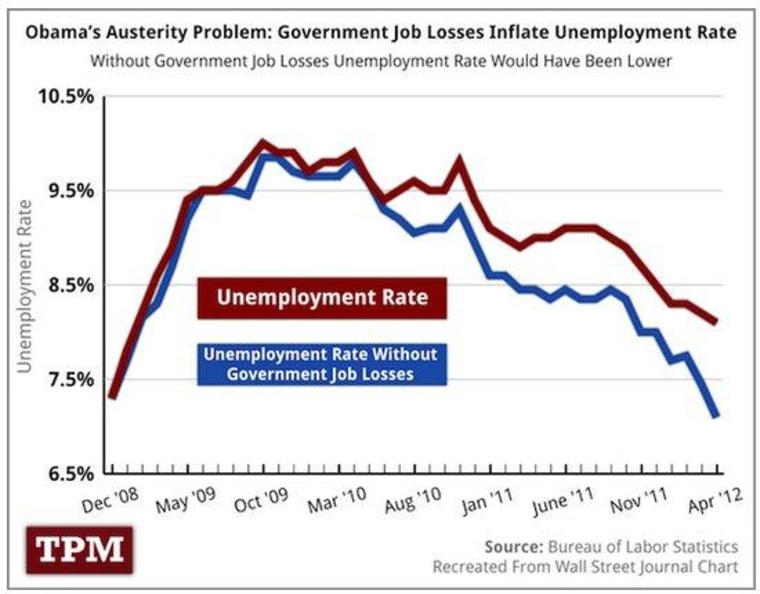President Obama spoke at SUNY Albany yesterday, sketching out an economic to-do list for Congress, and raised an important point that generally goes overlooked: when it comes to the recovery, "one of the biggest drags on our economy" has been public-sector layoffs.
"[A]fter there was a recession under Ronald Reagan, government employment went way up. It went up after the recessions under the first George Bush and the second George Bush. So each time there was a recession with a Republican President, we compensated by making sure that government didn't see a drastic reduction in employment."The only time government employment has gone down during a recession has been under me. So I make that point just so you don't buy into this whole bloated government argument that you hear."
It's maddening in large part because so much of the global economic crisis was hard to control, but this aspect -- public-sector employment -- was easy. It was within Washington's power to prevent the layoffs of teachers, firefighters, and police officers, and Democrats did that for a while in 2009, but as stimulus funds ran out, mass layoffs began. Republicans were given an opportunity to save these jobs, but they refused, arguing that the economy would improve if more public-sector workers were unemployed.
We're left to wonder what could have been, but we have some ideas. The Wall Street Journal ran an important piece the other day, noting that the national unemployment rate would be 7.1% right now -- a full point lower than it is now -- if the government hadn't laid off so many public-sector workers. TPM's Brian Beutler published this great chart this morning:
There's no great mystery here. The right doesn't like it, and Republicans prefer to pretend the facts are wrong, but there's one key difference between our weak economic recovery and a more robust one: our government is shrinking at the worst possible time.
The New York Times' Floyd Norris had this report earlier in the week (which was accompanied by some amazing charts).
For the first time in 40 years, the government sector of the American economy has shrunk during the first three years of a presidential administration.Spending by the federal government, adjusted for inflation, has risen at a slow rate under President Obama. But that increase has been more than offset by a fall in spending by state and local governments, which have been squeezed by weak tax receipts.In the first quarter of this year, the real gross domestic product for the government -- including state and local governments as well as federal -- was 2 percent lower than it was three years earlier, when Barack Obama took office in early 2009.
Republicans will scream until they're blue in the face that the problem with the economy is that the government is too big and it's getting bigger. Their detachment from reality is breathtaking -- the biggest drag on the economy over the last three years has been our shrinking government.
If the growth of America's public sector was in any way similar to that of the Reagan or Bush eras, we'd be looking at a healthy, robust economic recovery. But it's not. The shrinking public sector is a form of American austerity and it's holding us back. The economy under the Republican administrations benefited from a growing government, but it's advantage Obama does not have.
Mitt Romney, incidentally, is eager to exacerbate the problem, working from the assumption that even more layoffs will make the economy stronger.
